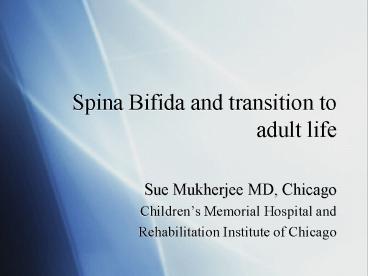Spina Bifida and transition to adult life - PowerPoint PPT Presentation
1 / 22
Title:
Spina Bifida and transition to adult life
Description:
The process of learning and mastering skills needed for successful adult life ... Adult clinic run/started by pediatrics, at own site ... – PowerPoint PPT presentation
Number of Views:110
Avg rating:3.0/5.0
Title: Spina Bifida and transition to adult life
1
Spina Bifida and transition to adult life
- Sue Mukherjee MD, Chicago
- Childrens Memorial Hospital and
- Rehabilitation Institute of Chicago
2
Transition
- The process of learning and mastering skills
needed for successful adult life - Medical and other Decision making
- Self care and hygiene
- Socializing, maintaining relationships
- Work skills, finding a meaningful activity
- Occurs over many years, esp. high school
- May include transfer of care to adult providers,
with adult style medical care
3
Definition of Transition
- Transition is defined as
- the purposeful, planned movement of adolescents
and young adults with chronic physical and
medical conditions from child-centered to
adult-oriented health care systems. - Healthcare Transition ? Transfer of Care
- Transition is a Process, not an Event
- Transition begins long before the actual transfer
of care
Society of Adolescent Medicine. J Adol Health.
199314570-6.
4
Looking back
- Spina bifida survival improved dramatically with
shunt and bladder management in the 1950-70s - Accessibility and community living has improved
greatly from the 1970s to now
5
Looking forward
- Spina bifida remains a complex condition with
multiple health issues that may need attention on
a daily basis - Learning to manage these health issues, plus
progress with other life skills takes more time
and practice
6
Looking forward
- The next challenge is to ensure that all young
people with spina bifida get the chance to be as
independent as possible - Transition-focused clinics and therapy are a key
resource to help assess and teach youth and
families these skills
7
The present
- Currently, transition skills are learned in many
settings - School, therapy, at home, MM clinic,
pediatrician, community groups - There is no best way to deliver these services
- Specialized clinics provide ideas and peer support
8
Skills to master
- Self care ADLs
- Bowel, bladder and skin health management
- Healthy diet and fitness
- Money, medical and household decisions
- Social relationships and activities
- Educational and vocational achievement
- Community mobility
9
Barriers for transition
- Time-intensive
- Effort intensive
- Money (personnel)
- Know-how
- Competing interests and priorities
10
Barriers for transfer
- Comfort with pediatric expert team
- Fear of the unknown
- Knowledge about it still lacking
- Few trained adult providers
- Insurance issues for adults
- Adults may not be able to take responsibility
- Finding supports in the community
11
Opportunities in transferring
- Competence in adult care for spina bifida
- Adult health and aging issues dealt with
- Adult support resources available
- Vocational resources more prevalent in adult
facilities - Away from pediatric setting
- Pride in achievement/success of difficult task
- Increased choice/autonomy in decisions
- Adult services are lower cost
12
Whats working
- Greater interest and knowledge across pediatrics
- Slowly increasing knowledge and interest from
adult providers - More role models and mentors
13
Successes
- Gillette Lifespan care center
- Adult clinic run/started by pediatrics, at own
site - Adult care expertise developed by adult providers
- Chicago
- transition clinic embedded in multidisc MM clinic
- transfer of care part of team moves to adult
clinic with adult providers - Cincinnati
- Primary care approach to transition with
vocational services and social work in clinic
14
Looking forward
- Need increased contact of adolescents with MM
team to identify and plan transition skills
building needs and opportunities - Currently adolescents tend to REDUCE visits to
clinic, as they are healthy - Vocational counseling needs to be a bigger focus
15
You said
- A focus group with youth with disabilities shared
some insights on what they wanted medical
students to understand - I think educating people is important to make
them realize we can have real jobs and families
too.
16
You said
- I feel out of place with Mickey mouse on the
walls, and a baby crying in the next bed. - Ill miss the great doctors and nurses that Ive
known my whole life, Im sad to leave! - I was really scared when I came to the new
hospital, but it all worked fine, and now Im
proud I did it!
17
- Transition of adolescence is an important time,
with many mixed feelings of fear, anxiety,
anticipation and pride. - There are lost relationships, and development of
new care relationships which takes time.
18
The next frontier!
- Many clinics have recognized the importance of
supporting development of adolescent skills, and
preparation for adulthood. - Work needs to be done on understanding the impact
of cognitive and planning issues.
19
The next frontier!
- Peer mentorship and role modeling can play a key
role - Set high expectations
- Support step-wise skills gains
- Celebrate progress!
- Offer support at difficult times
20
Healthcare Transition
- Adolescent
- Developmental level
- Learning style
- Motor skills
- Mental Health
- Health Providers
- Knowledge
- Medical home
- Institutional support
- Financial/Insurance support
- Community
- Supported living
- Case facilitation
- Voc rehabilitation
- Family
- Health literacy
- Family health
- Finances
- School
- Voc/Ed
- Living skills
- Behavior support
21
The Next Frontier
- Clinics will compare outcomes for transition
- Need to do capacity building in adult services
- Training for adult care providers
- Work closely with adult providers to improve care
delivery at all levels
22
(No Transcript)































